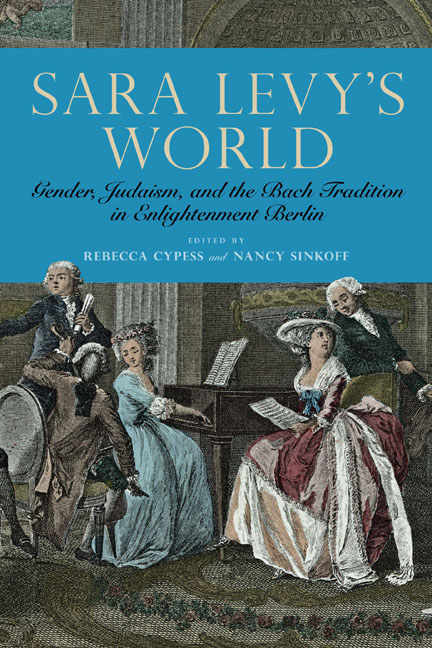Book contents
- Frontmatter
- Dedication
- Contents
- Acknowledgments
- Introduction: Experiencing Sara Levy’s World
- Part One Portrait of a Jewish Female Artist: Music, Identity, Image
- Part Two Music, Aesthetics, and Philosophy: Jews and Christians in Sara Levy’s World
- Part Three Studies in Sara Levy’s Collection
- Appendix: The Salonnière and the Diplomat: Letters from Sara Levy to Karl Gustav von Brinckmann
- Bibliography
- List of Contributors
- Index
8 - Duets in the Collection of Sara Levy and the Ideal of “Unity in Multiplicity”
Published online by Cambridge University Press: 21 April 2021
- Frontmatter
- Dedication
- Contents
- Acknowledgments
- Introduction: Experiencing Sara Levy’s World
- Part One Portrait of a Jewish Female Artist: Music, Identity, Image
- Part Two Music, Aesthetics, and Philosophy: Jews and Christians in Sara Levy’s World
- Part Three Studies in Sara Levy’s Collection
- Appendix: The Salonnière and the Diplomat: Letters from Sara Levy to Karl Gustav von Brinckmann
- Bibliography
- List of Contributors
- Index
Summary
As we begin increasingly to explore Sara Levy and her world from the interdisciplinary perspective that she seems to warrant through her position in both Jewish history and musical history, we test the limits of both fields to accommodate and speak to one another. The complexities of Sara Levy as a subject of interdisciplinary study are clear: very few written documents survive that attest to her views of her religion, her musical activities, or her views on her social and cultural environments, let alone her understanding of the connections among these various aspects of her intellectual, spiritual, and artistic life. And yet we would be mistaken not to consider her as a complete individual, with all of the complexities that her biography connotes. Levy lived, after all, in a predisciplinary world, in which the aesthetic, the religious, and the political were deeply intertwined, and in which all of these had tangible ramifications for the lives of enlightened individuals.
In this chapter I propose to explore a test case for an interdisciplinary approach to Sara Levy. I will consider a portion of the music that she is known to have held in her collection and that she likely played or heard in her salon. I will then explicate the social practices upon which this music drew, and read it metaphorically, attempting to understand what it might have meant for the modernizing Jews of Berlin. Through consideration of the ideas of Moses Mendelssohn, whose monumental corpus of writings dealt both with aesthetics and with a political philosophy that he envisioned as allowing Christians and Jews to coexist within a tolerant society, I argue that Sara Levy's musical activities may be understood as a representation of the ideals—however unrealistic— that Mendelssohn and his followers sought to put into place.
The repertoire that I consider here is that of duets for two identical or similar instruments in manuscripts that Sara Levy collected, some of which she is thought to have commissioned. These include duets for two flutes, for two violas, and for two keyboard instruments. The tradition for all of these types of duet extended to the early eighteenth century, with some theorists reaching back far enough to connect them to the pedagogical bicinia of the Renaissance. Yet these pieces took on a distinctive meaning in the second half of the eighteenth century.
- Type
- Chapter
- Information
- Sara Levy's WorldGender, Judaism, and the Bach Tradition in Enlightenment Berlin, pp. 181 - 204Publisher: Boydell & BrewerPrint publication year: 2018



